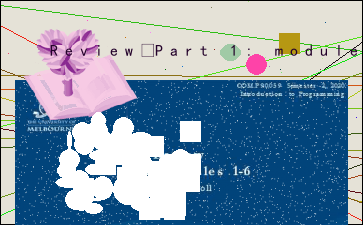Review Part 1: modules 1-6课件
以下为《Review Part 1: modules 1-6课件》的无排版文字预览,完整格式请下载
下载前请仔细阅读文字预览以及下方图片预览。图片预览是什么样的,下载的文档就是什么样的。
Review Part 1: modules 1-6Kylie McCollToday
Review questions from topics 1-6:
Computers, algorithms, programs, and Python
I/O, Variables and expressions
Conditionals
Sequences
Functions
Iteration
ConceptsTo solve problems computationally requires:
A “Computer”
An Algorithm
An executable program
Python is:
A high-level programming language (closer to natural language than machine code)
an?interpreted language?as implementations execute instructions without previously?compiling?a program into machine-language?instructions
Concepts continuedPython programs perform calulations using expressions
Functions are mini-programs, and Python programs are built from many functions
Python programs must be readabile as well as correct, so that they can be used by other programmers
Python programs should be documented so that they can be used by other programmers
Errors occur when a Python program isn’t written correctly (syntax errors), or when it is written correctly but the instructions can’t be completed (runtime errors)
Even when error-free, Python programs may not produce the correct output (logic errors); in either case, we can use systematic strategies for finding and removing bugs from our Python programs
ConceptsInput and print functions
Check understanding of these in-built functions. Common errors: f-strings for formatting string literals
Variables and data types
int, float, boolean, string, list, tuple, set, 内容过长,仅展示头部和尾部部分文字预览,全文请查看图片预览。 ? University of Melbourne 2020
These slides include materials from:
COMP90059 - Introduction to Python Programming lecture slides 2017-2018 by Matthew Farrigia-Roberts and Steven Bird
ISYS90088 - Introduction to Application Development lecture slides semester two, 2018 by Antonette Mendoza
[文章尾部最后300字内容到此结束,中间部分内容请查看底下的图片预览]
以上为《Review Part 1: modules 1-6课件》的无排版文字预览,完整格式请下载
下载前请仔细阅读上面文字预览以及下方图片预览。图片预览是什么样的,下载的文档就是什么样的。
图片预览















